How Does A Plant Based Diet Improve Health?

Switching to a plant based diet can greatly improve your health. Eating more plant-based foods like fruits, veggies, whole grains, legumes, nuts, and seeds helps lower the risk of many diseases. This includes heart disease, stroke, obesity, high blood pressure, high cholesterol, type 2 diabetes, and some cancers.
Red and processed meats are high in cholesterol and saturated fat. These can harm your heart. Eating less meat and more plant-based foods cuts down on these bad fats. It also boosts your heart health. Plus, a plant-based diet is full of fiber, antioxidants, and other good stuff that helps keep you healthy and lowers disease risk.
Key Takeaways
- A plant-based diet lowers the risk of heart disease, stroke, obesity, high blood pressure, high cholesterol, type 2 diabetes, and some cancers.
- Red and processed meats have a lot of cholesterol and saturated fat, which isn’t good for your heart.
- Eating more plant-based foods, like fruits, veggies, whole grains, legumes, nuts, and seeds, makes you healthier.
- A plant-based diet is full of fiber, antioxidants, and other good stuff that helps you stay healthy.
- Going plant-based doesn’t mean you can’t eat meat. It means eating more plant-based foods and choosing lean meats in moderation.
Introduction to Plant-Based Diets
A plant-based diet focuses on eating foods from plants like fruits, vegetables, whole grains, legumes, nuts, and seeds. It doesn’t mean you can’t eat animal products, but they’re not the main focus. People choose this diet for many reasons, like better health benefits, lowering the risk of diseases like type 2 diabetes, helping the environment, or ethical beliefs.
Also Read : What Are The Benefits Of Brightening Face Masks?
Definition and Overview
This diet puts whole grains, legumes, fruits, and vegetables at the center. It also allows for some animal-based foods like dairy, eggs, or lean meats. But, the main focus is still on plant-based eating.
Also Read : What Are The Best Skin Care Tips For Healthy Skin?
Reasons for Adopting a Plant-Based Diet
- Improved health benefits and lower risk of diseases like type 2 diabetes and heart disease
- Helps with weight management and can lead to fewer obesity cases
- It’s better for the environment and reduces carbon emissions
- Matches with ethical beliefs, such as animal welfare or vegetarian or vegan lifestyles
Choosing a plant-based diet brings many benefits. It supports health and helps the planet. By eating more whole grains, legumes, fruits, and vegetables, you’re moving towards a healthier and greener life.
Also Read : What Are Common Types Of Skincare Treatment?
Plant-Based Diet and Weight Management
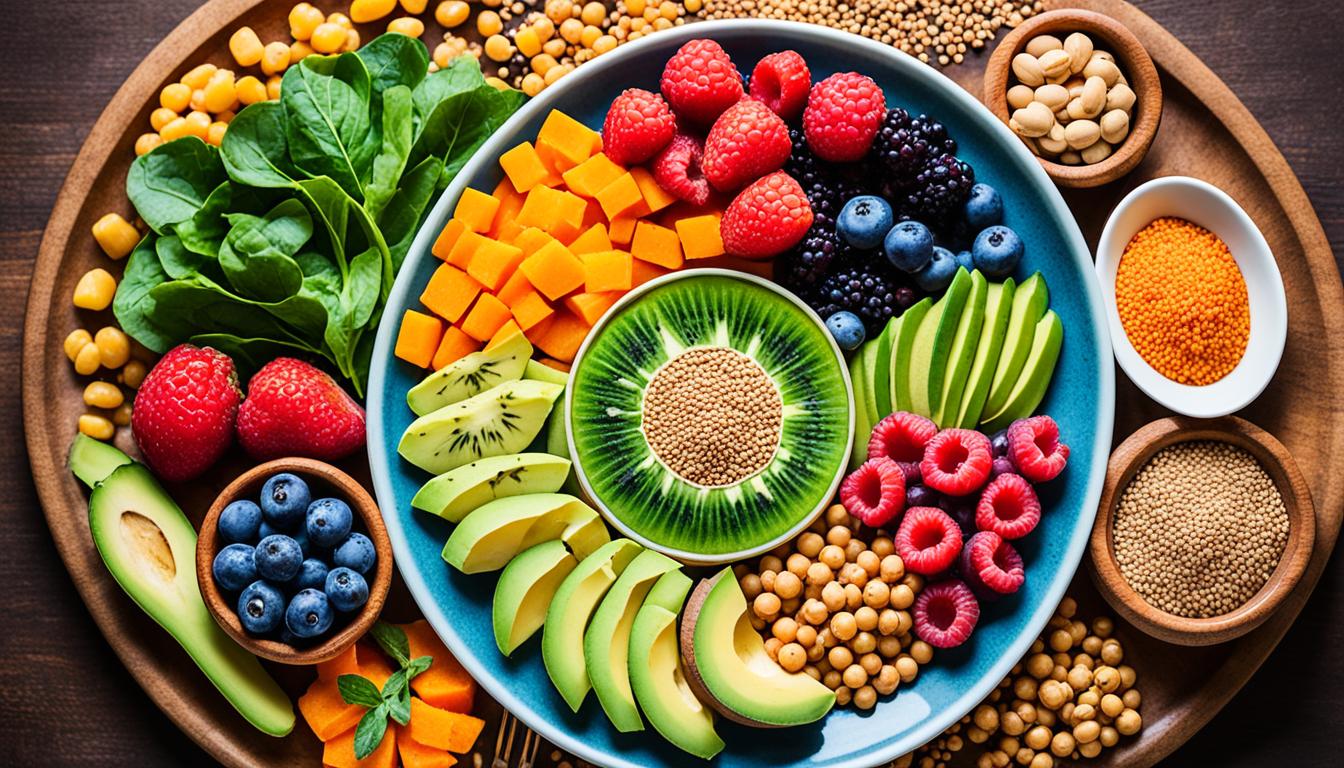
Studies show that a plant-based diet helps keep a healthy weight and lowers obesity risk. Eating more whole, minimally processed plant-based foods like veggies, fruits, whole grains, and legumes aids in weight control.
Also Read : Why Is Sun Safety Important For skin?
A plant-based diet is linked to lower obesity rates than omnivorous diets. This is because whole, plant-based foods are high in fiber, nutrients, and low in calories. They make you feel full and satisfied without eating too many calories.
Also Read : What Are The Best Skincare Tips For Beauty?
But, not all plant-based foods are the same. Highly processed plant-based products, like some meat substitutes or snacks, may not be as healthy. They can be loaded with added sugars, unhealthy fats, and sodium. These can hinder weight management efforts.
In summary, a plant-based diet focused on nutrient-dense, whole plant-based foods is great for keeping a healthy weight and lowering type 2 diabetes risk. By eating more vegetables, fruits, whole grains, and legumes, you can reduce obesity risk and enjoy the health perks of a plant-based lifestyle.
Plant-Based Diet and Diabetes Prevention
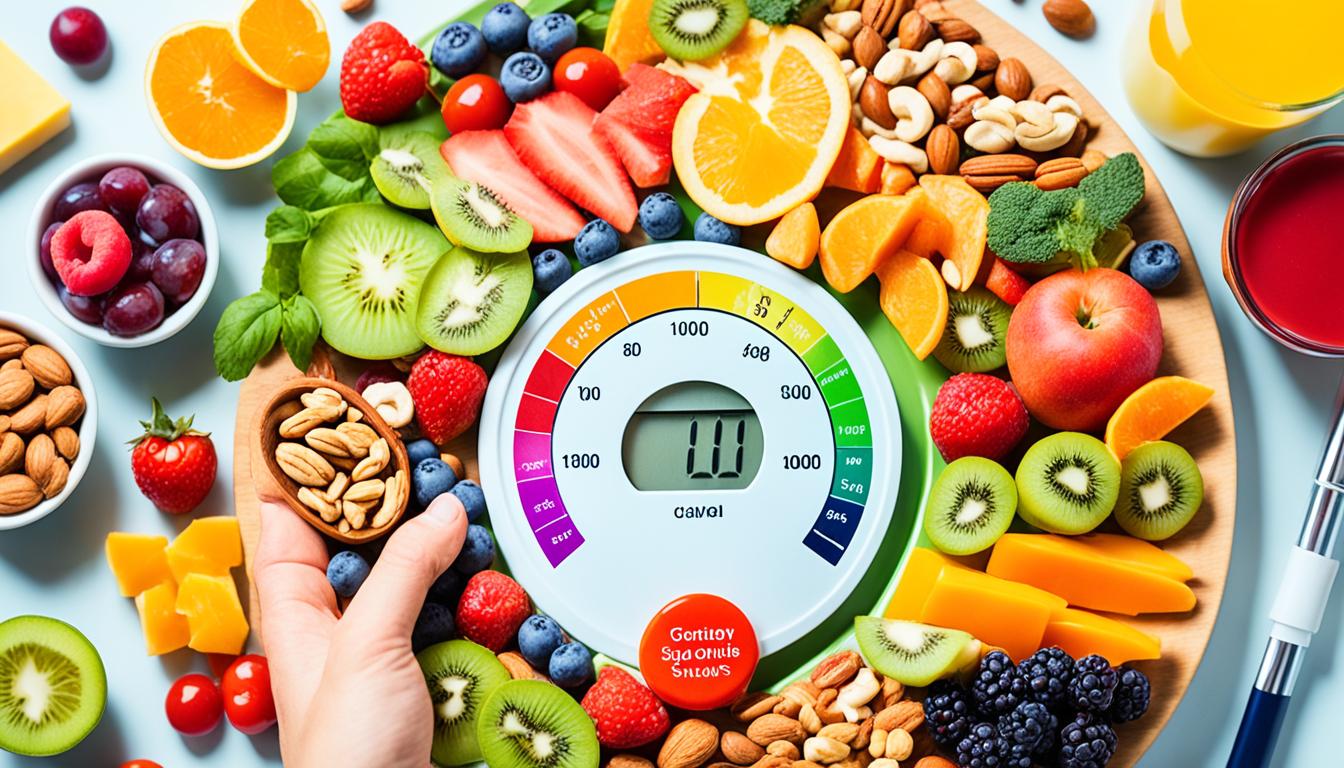
Many studies show that eating plant-based foods can help prevent and manage type 2 diabetes. People who eat vegan or vegetarian diets are less likely to get type 2 diabetes than those who eat more animal-based foods.
Plant-based diets are high in fiber, complex carbs, and low in fat. These nutrients help control blood sugar and make insulin work better. This can lower the risk of getting type 2 diabetes. The benefits of eating plant-based foods go beyond just helping with weight control.
“A growing body of research indicates that a vegan diet is associated with a lower incidence of type 2 diabetes compared to omnivorous diets.”
A study in the journal Nutrients found that eating a vegan diet can lower the risk of type 2 diabetes by 35%. This shows that plant-based diets could be a good way to prevent diabetes.
| Diet | Risk Reduction for Type 2 Diabetes |
|---|---|
| Vegan | 35% lower risk |
| Vegetarian | 12% lower risk |
| Non-vegan/non-vegetarian | Reference |
Eating more plant-based foods can help prevent type 2 diabetes and keep your metabolism healthy.
Plant-Based Diets for Heart Health
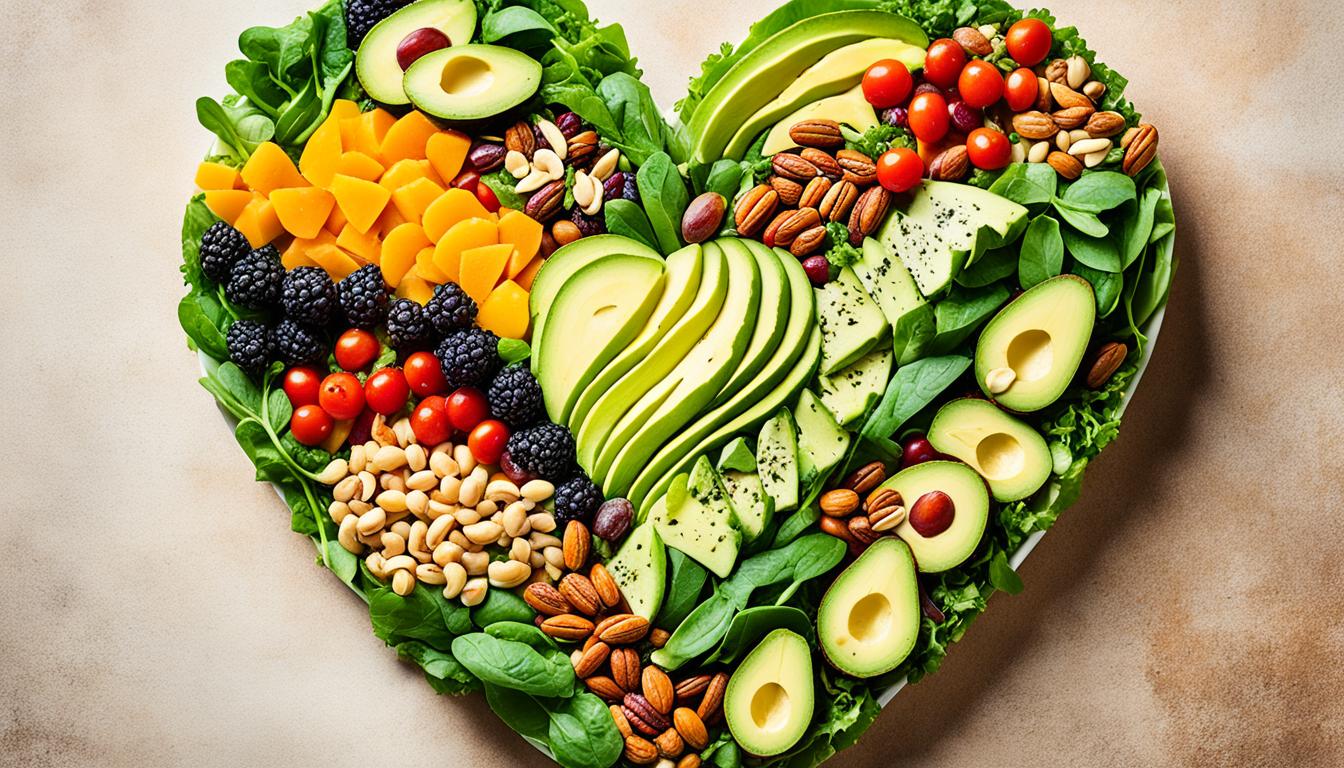
Choosing a plant-based diet can greatly improve heart health. It cuts down on saturated fat and cholesterol from animal products. This can lower the risk of heart disease and stroke.
Studies show that those eating more plant-based foods have a lower risk of heart problems. This is compared to those eating more meat and dairy.
The reason a plant-based diet is good for the heart is its nutrient-rich foods. These foods are full of fiber, antioxidants, and healthy fats. These nutrients help improve blood pressure, cholesterol, and heart function.
This can also lower the risk of diabetes and other heart-related conditions. These conditions often come with poor heart health.
Reducing Risk of Heart Disease and Stroke
Many studies have looked into how diet affects heart health. A big review found that starting a plant-based diet can cut the risk of heart diseases by 40%. This is compared to diets focused on losing weight.
A plant-based diet helps prevent heart disease and stroke in several ways:
- It reduces saturated fat and cholesterol, which helps prevent artery plaque buildup.
- It increases fiber, antioxidants, and healthy fats. These improve blood flow and reduce inflammation.
- It helps manage blood pressure and cholesterol levels, which are key heart disease and stroke risks.
Switching to a plant-based diet is a step towards a healthier heart. It also lowers the risk of diabetes and other heart issues.
Plant based Diet
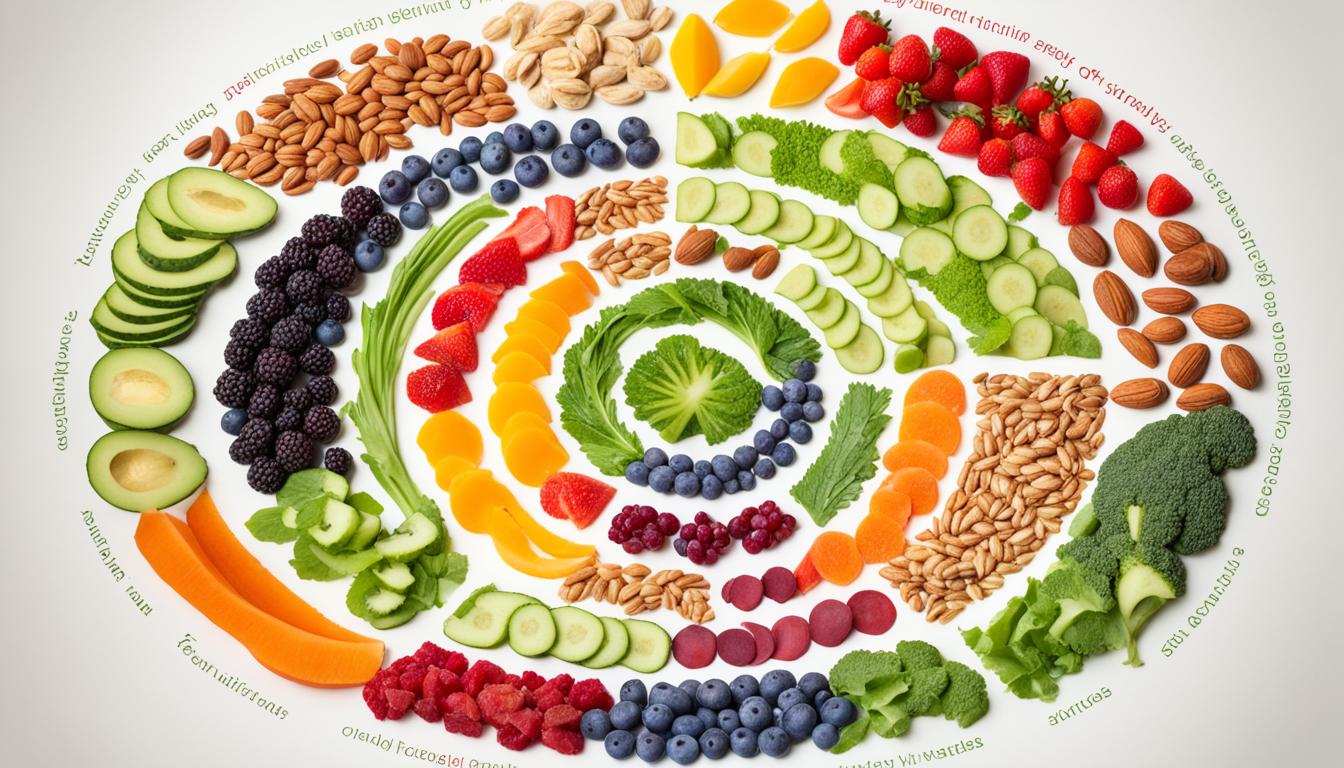
A well-planned plant-based diet is packed with vitamins, minerals, and antioxidants. People who eat a plant-based diet are less likely to get chronic diseases. They also enjoy better health overall.
Plant-based diets focus on whole, minimally processed foods. This helps with weight control, lowers inflammation, and reduces the risk of heart disease, type 2 diabetes, and some cancers.
Nutrient Density and Health Benefits
The plant-based diet is rich in nutrients. People who eat plant-based diets get more fiber, antioxidants, and phytochemicals. These help fight inflammation and stress in the body.
Studies show that a plant-based diet helps with weight loss. People assigned to plant-based diets lost more weight than those on other diets.
- Increased intake of fiber, antioxidants, and phytochemicals
- Reduced inflammation and oxidative stress
- Improved weight management and weight loss
- Lower risk of chronic diseases like heart disease, type 2 diabetes, and certain types of cancer
Choosing a plant-based diet is a great way to boost your health. It can lower the risk of many chronic conditions.
Plant-Based Protein Sources
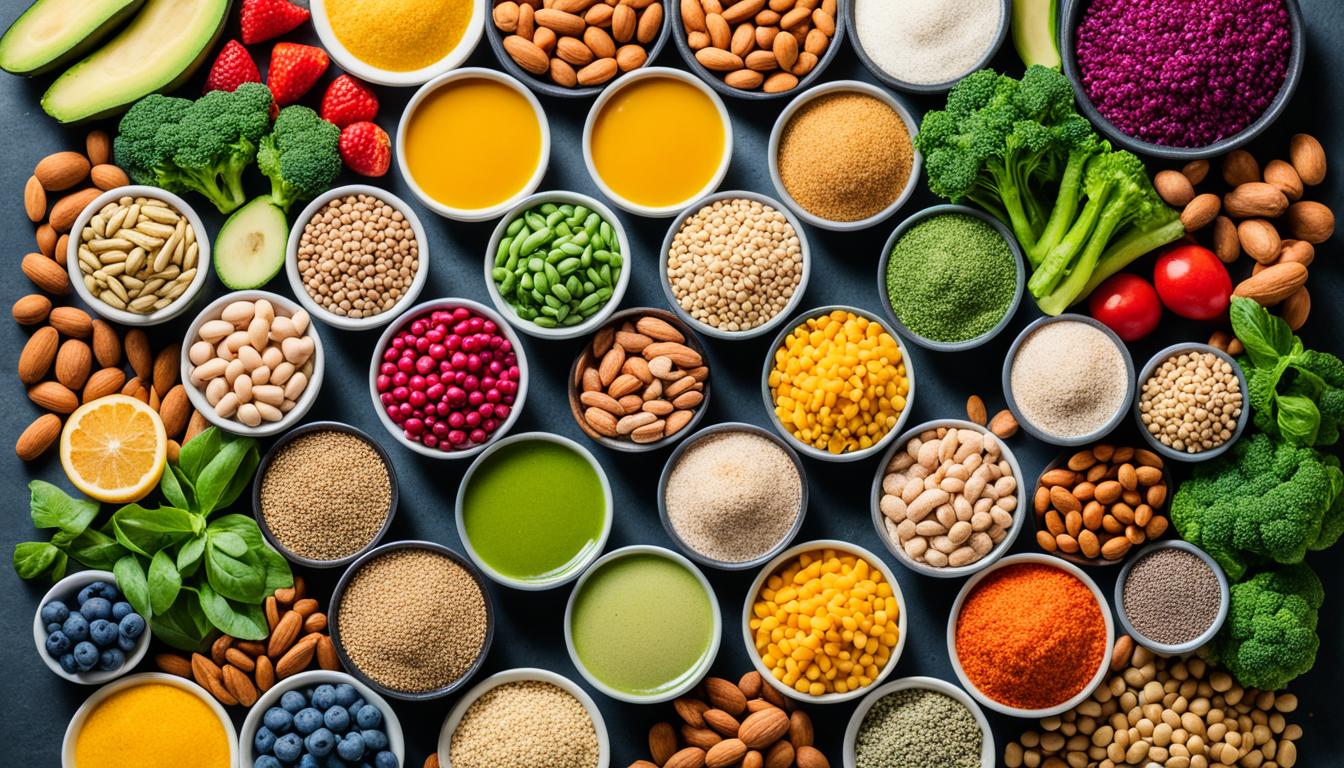
Following a plant-based diet means making sure you get enough protein. Luckily, there are many plant-based proteins that help with weight loss and a plant-based lifestyle.
Legumes: A Powerhouse of Plant-Based Protein
Legumes like beans, lentils, and chickpeas are great for plant-based protein. They fit into many dishes, from stews to curries. Enjoying legumes lets you get protein and try new plant-based recipes.
Nuts and Seeds: Nutrient-Dense Protein Powerhouses
Nuts and seeds, like almonds, walnuts, and chia seeds, are also great for protein. They give you protein and important vitamins, minerals, and fats. Adding nuts and seeds to your diet helps meet your protein needs.
Whole Grains: A Complementary Protein Source
Whole grains, such as quinoa, brown rice, and oats, offer plant-based protein too. They’re not as high in protein as some other options but still add to your protein intake. Mixing different protein sources makes your diet more balanced.
| Plant-Based Protein Source | Protein Content (per 100g) |
|---|---|
| Lentils | 25g |
| Chickpeas | 15g |
| Almonds | 21g |
| Quinoa | 4g |
Adding different plant-based proteins to your diet ensures you get enough protein. Whether you’re starting or already on a plant-based path, these options support your health.
Transition to a Plant-Based Lifestyle

Starting a plant-based diet doesn’t mean you have to do it all at once. A step-by-step approach is often better for the long term. You can begin with “Meatless Mondays,” skipping meat just one day a week. Then, you can add more meat-free days as you get used to eating more plants.
Studies show that eating more plants is good for your health. It helps with weight control and lowers the risk of serious diseases like heart disease and diabetes. Adding more plant-based foods makes your diet both healthy and enjoyable, without big changes all at once.
Exploring Plant-Based Recipes
Finding tasty plant-based recipes is key to sticking with a plant-based diet. Try out different legumes, grains, fruits, and veggies to find what you like. With creativity and an open mind, you can find many delicious and healthy plant-based meals.
“The transition to a plant-based lifestyle is a journey, not a destination. Take it at a pace that feels comfortable and sustainable for you.” – Registered Dietitian, Jessica Andersson
Remember, changing to a plant-based lifestyle is a journey, not a goal. By taking it slow and enjoying the process, you can make lasting changes that help your health and happiness.
Addressing Common Concerns

As more people turn to plant-based diets, some worry about making the switch. But, with some knowledge and planning, a plant-based diet can be both healthy and satisfying.
One worry is getting enough protein. But research shows that plant-based diets can easily meet protein needs. Foods like legumes, nuts, seeds, and whole grains are great sources of protein. Many plant-based foods are packed with high-quality protein.
Nutrient density is another concern. Yet, a well-planned plant-based diet covers all essential vitamins, minerals, and antioxidants. To get enough vitamin B12 or omega-3s, include plant-based foods like fortified milks, seaweed, and chia seeds in your diet.
It can be tough to satisfy cravings for certain foods. But, there are many tasty plant-based recipes and snacks. From creamy nut-based sauces to rich plant-based desserts, there’s a lot to choose from.
“A well-planned plant-based diet can provide all the necessary nutrients, including protein, through a variety of plant-based foods.”
By tackling these common worries and trying different plant-based foods, people can start a plant-based diet that’s both healthy and fun.
Also Read : Can Beetroot Juice Reduce Dark Spots On The Skin?
Conclusion
Eating a plant-based diet is a great way to boost your health. These diets are often low in bad fats and high in fiber. They also pack in vitamins and minerals that are good for you.
Plant-based diets help with weight control, prevent diabetes, and keep your heart healthy. By eating whole, nutrient-rich plant foods, you can enjoy the perks of a plant-based life. Whether you’re just starting or want to eat more plant-based, there are many resources and recipes to help you.
Plant-based foods are tasty and can make you feel good. Take the chance to try different plant-based options. Discover how a plant-based diet can change your health for the better.
FAQs
Q: What is a plant-based diet?
A: A plant-based diet focuses on consuming foods primarily derived from plants, such as fruits, vegetables, nuts, seeds, whole grains, and legumes, while minimizing or eliminating animal products.
Q: How can plant-based eating improve health?
A: Plant-based eating is associated with numerous health benefits, including reduced risk of chronic diseases like type 2 diabetes, heart disease, and certain cancers, as well as promoting overall well-being and healthy body weight.
Q: What are the benefits of a plant-based diet for beginners?
A: Starting a plant-based diet can lead to improved digestion, increased energy levels, clearer skin, better weight management, and a reduced risk of developing diseases related to poor dietary choices.
Q: How does a plant-based meal compare to a traditional animal food meal?
A: A plant-based meal typically contains more fiber, antioxidants, vitamins, and minerals while being lower in saturated fats and cholesterol compared to meals centered around animal foods.
Q: Can a plant-based diet help with managing type 2 diabetes?
A: Studies have shown that adopting a plant-based diet may reduce the risk of developing type 2 diabetes and help individuals with diabetes better manage their blood sugar levels due to the diet’s emphasis on whole, unprocessed foods.
Q: What are the potential health benefits of a plant-based diet?
A: The health benefits of a plant-based diet include improved heart health, lower blood pressure, reduced inflammation, enhanced weight management, better digestion, and a lowered risk of chronic diseases.
Q: How are plant-based diets linked to exercise and overall health?
A: Research has found that plant-based diets are associated with improved exercise performance, quicker recovery times, reduced inflammation, and enhanced overall health due to the nutrient-dense nature of plant-based foods.
